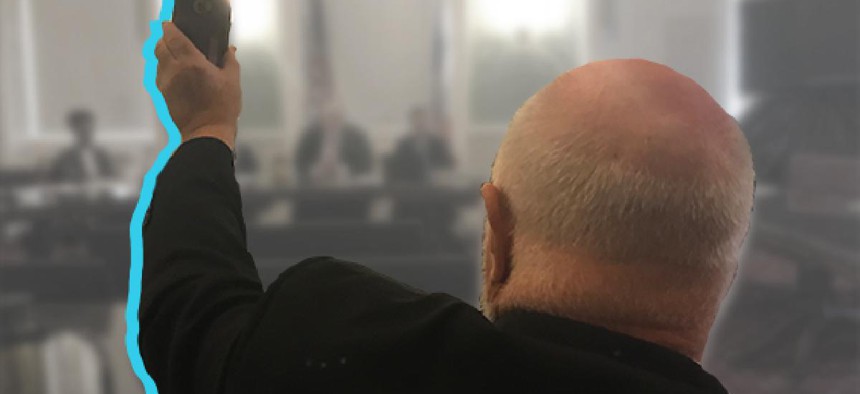Three updates on how the 2019 New York City budget could affect nonprofits

Illustration by Zach Williams/NYN Media
Nonprofit leaders asked for $200 million in additional funding for human services nonprofits at the March 27 meeting of the New York City Council Committee on Contracts.
The funding would address two key issues facing nonprofit contractors: increasing employees benefit costs, and reconciling the costs of services with what the city actually ends up paying at the end of the city procurements process. A $500 million boost would meet that goal. This year’s budget already includes $300 million. Advocates want that remaining $200 million to complete their request.
Testimony from representatives of the Human Services Council, the Chinese-American Planning Council, LiveOn NY, and Catholic Charities of the Archdiocese of New York followed that of representatives from the Mayor’s Office of Contract Services (MOCS) who touted progress with modernizing the city’s procurements process as well as gave a report on how the preliminary budget for next year would affect the office.
Councilman Justin Brannan, the new chair of the contracts committee, said in an interview after his second meeting that he would continue to give attention to the financial plight of human services nonprofits, such as contracts that fund senior services.
“Meals to seniors, feeding the hungry, these services are absolutely critical to the city,” he said “But the city is putting (out) $2 million dollar contracts to feed x amount of people (but) it actually costs $3 million dollars – that’s a problem.”
Here are three takeaways from the meeting:
Nonprofits have a united message on how to fix city contracts
Two nonprofits – The Chinese-American Planning Council and LiveOn NY – submitted the same paragraph outlining the sector’s demands: A 15 percent floor for indirect costs and “a 10 percent increase in the portions of human services contracts covering occupancy and casualty and liability insurance.”
Kevin Sullivan, executive director of Catholic Charities of the Archdiocese of New York added flavor to these arguments by wielding an empty pizza box during his testimony. The priest waved his cell phone before the committee to underscore his point that if a pizza chain such as Domino’s has already implemented a smartphone app where he could order with the push of a button, receive alerts as his toppings accrue, and track its delivery, then New York City should be able to implement a more efficient procurements process.
“The goal should be a Domino’s app for human services contracting and just give us a full pie when you buy services from us,” Sullivan said.
Michelle Jackson, general counsel for the Human Services Council of New York, added that the united voice of providers continues to grow with the creation of the Human Services Advancement Strategy Group which has brought together nine membership organizations representing 2,000 groups from across the city to advocate for more city funding. A 37 percent “fringe rate” – essentially indirect costs such as employee benefits – would bring all human services nonprofits up to industry standard, according to the Human Services Council testimony.
“If the city intends to make significant progress in its fight against homelessness, mental health and other important human services issues, it must strengthen its commitment to the very organizations that do this critical work every single day,” she said in her testimony.
More money and more services don’t always go hand in hand at MOCS
Dan Symon, acting director of the Mayor’s Office of Contract Services, highlighted the progress that two modernization initiatives have had on the city procurements process. The city expects that the PASSport system and HHS Accelerator will be fully implemented in the next two years. The online document processing hubs will receive $1.9 million and $3.2 million respectively in the preliminary budget for the upcoming fiscal year.
The office, however, has had trouble filling positions that were funded in previous budgets, according to a MOCS report submitted to the committee on March 27. The office is expected to house a complement of 190 full-time positions. Although, the budget has provided for all of these positions, 45 percent of them were vacant at the end of 2016 and one quarter of them were still vacant at the end of 2017.
Meanwhile, the city will is planning to accomplish all of these contracting goals with a smaller budget. Overall funding for contracts will actually decrease this upcoming year to $15.55 billion under the preliminary budget – down from $15.8 last year, according to the report.
Five departments are seeing strong growth
The departments overseeing education, homeless services, health, social services and child welfare have seen a dramatic increase in their share of city contracts in recent years. Their contracts account for 77 percent of all procurements. The city Department of Homeless Services and Administration for Children’s Services have seen the most dramatic spikes in funding, according to the report.
The largest overall human services categories in the Fiscal 2019 preliminary contract budget are homeless family services ($1.56 billion) children’s daycare ($802 million) mental hygiene services ($596 million) and individual homeless services ($565 million).
“The growth in the share of the contract spending attributable to the top five agencies reflects a growth in spending paid to human service vendors,” the reports states.
The City Council response to de Blasio’s proposed budget is expected early next month. A date for the next meeting of the Committee on Contracts has yet to be set, according to the council’s website.
Correction: The original version of this article misspelled the name of New York City Councilman Justin Brannan.